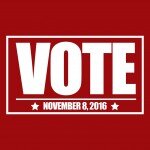Can Condo Associations Bar Political Signs in Common Areas?
A tiny political sign triggered a giant-sized dispute in a Colorado condominium, when the association manager said the sign violated an association rule governing common area displays and told the residents to remove it. The college students renting the unit, who had hung the 1.5' x 1' sign (supporting Bernie Sanders) from their balcony, complained that the removal order violated their free speech rights. But faced with a one-time fine of up to $5,000 plus an additional $25/day while the violation continued, they complied. When the unit’s owner threatened to sue the association, the board decided the manager had erred and rescinded the removal demand.Although this incident involved a Colorado condominium, it attracted my attention and should attract yours, because political signs, and disputes related to them, will likely proliferate during this presidential election year. Underlying these disputes is a question the Massachusetts courts have considered, but not fully resolved: To what extent can condo owners waive the First Amendment rights guaranteed by the U.S. Constitution.Preu: Laying the GroundworkA Massachusetts Appeals Court addressed a related question in a 2011 decision (Old Colony Village Condominium vs. Preu) that we have discussed in previous alerts (November, 2012, March, 2013). To summarize briefly, the Preu decision asserted for the first time that Constitutional protections for free speech might apply in Massachusetts condo communities. This was significant and potentially groundbreaking, because the courts have traditionally held that individuals can assert their First Amendment rights only against “state actors” (governmental entities); private parties can’t be held liable for Constitutional violations.
The college students renting the unit, who had hung the 1.5' x 1' sign (supporting Bernie Sanders) from their balcony, complained that the removal order violated their free speech rights. But faced with a one-time fine of up to $5,000 plus an additional $25/day while the violation continued, they complied. When the unit’s owner threatened to sue the association, the board decided the manager had erred and rescinded the removal demand.Although this incident involved a Colorado condominium, it attracted my attention and should attract yours, because political signs, and disputes related to them, will likely proliferate during this presidential election year. Underlying these disputes is a question the Massachusetts courts have considered, but not fully resolved: To what extent can condo owners waive the First Amendment rights guaranteed by the U.S. Constitution.Preu: Laying the GroundworkA Massachusetts Appeals Court addressed a related question in a 2011 decision (Old Colony Village Condominium vs. Preu) that we have discussed in previous alerts (November, 2012, March, 2013). To summarize briefly, the Preu decision asserted for the first time that Constitutional protections for free speech might apply in Massachusetts condo communities. This was significant and potentially groundbreaking, because the courts have traditionally held that individuals can assert their First Amendment rights only against “state actors” (governmental entities); private parties can’t be held liable for Constitutional violations. In Preu, the Appeals Court held that bringing an action under the state condominium statute seeking costs pursuant to §6(a)(ii) for breach of a condominium restriction, makes the association a state actor, subjecting its rules to Constitutional scrutiny.While this was certainly a new interpretation of the law, it was not as unsettling as it seemed to be. Although courts typically apply an “intermediate” test to First Amendment restrictions, requiring that they be substantially related to an important governmental interest, there was some precedent in the Commonwealth supporting the position that lower level scrutiny might apply to condominium rule making, requiring only a reasonable relationship to a legitimate interest.This is no different from the reasonableness test the courts already apply to condominium rules: They must be reasonably related to the legitimate purposes of the association. So Preu may not have created a sea change or anything close to it in the way Massachusetts courts review limits on speech in condominium communities; reasonable restrictions may be upheld.However, it is possible the courts will decide that “political speech” should be treated differently, as the New Jersey Supreme Court concluded in a 2012 decision, Mazdabrook v. Khan. In that case, the court ruled that notwithstanding its broad authority to govern activities in common areas, an association could not ban the display of political signs, because, the court said, “Political speech lies at the core of our Constitutional speech protection…[which] is fundamental to democratic society” and thus outweighs the association’s property rights.A Higher StandardIt is not difficult to imagine that faced with the same question, Massachusetts courts would reach a similar conclusion and apply a higher Constitutional standard to restrictions on political speech. This higher level of Constitutional scrutiny could require associations to demonstrate not just a “significant” interest but a “compelling” one to justify the rules, and require further that the rules be “narrowly tailored” — that is, no more restrictive than absolutely necessary —to achieve the association’s goals.When considering First Amendment rights, the courts balance an individual’s interest in exercising those rights against the government’s interest in restricting them. In a condominium context, the courts must balance the Constitutional rights of individual owners against their collective right to govern their communities through elected boards. And I think the voluntary nature of condo ownership in most cases should tip the scales toward the community’s self-governance rights.The courts have recognized that people who live in condominium communities do so voluntarily and with the understanding that they may relinquish some rights – the right to smoke in their units, for example – that they could freely exercise in a single-family residence. There is no legitimate public policy reason for a court to conclude that a unit owner who chooses to live in a community association that regulates aesthetics, among other factors, could not voluntarily give up first amendment rights, as other owners have sacrificed their rights, to enjoy the benefits of living in a self-governing community.For many different reasons – including an interest in avoiding a dispute – some associations may choose to strike a compromise and permit the display of some political signs. While the Massachusetts courts might well balk (as the New Jersey Supreme Court did) at rules completely prohibiting political signs, I think, at a minimum, it is likely they would accept restrictions on the size of the signs, their location, and the time frame within which they can be displayed. These are the “time, place and manner” restrictions that have been generally recognized as permissible limitations on free speech, and it is the approach I would recommend for dealing with restrictions on political signs should an association decide to adopt them.
In Preu, the Appeals Court held that bringing an action under the state condominium statute seeking costs pursuant to §6(a)(ii) for breach of a condominium restriction, makes the association a state actor, subjecting its rules to Constitutional scrutiny.While this was certainly a new interpretation of the law, it was not as unsettling as it seemed to be. Although courts typically apply an “intermediate” test to First Amendment restrictions, requiring that they be substantially related to an important governmental interest, there was some precedent in the Commonwealth supporting the position that lower level scrutiny might apply to condominium rule making, requiring only a reasonable relationship to a legitimate interest.This is no different from the reasonableness test the courts already apply to condominium rules: They must be reasonably related to the legitimate purposes of the association. So Preu may not have created a sea change or anything close to it in the way Massachusetts courts review limits on speech in condominium communities; reasonable restrictions may be upheld.However, it is possible the courts will decide that “political speech” should be treated differently, as the New Jersey Supreme Court concluded in a 2012 decision, Mazdabrook v. Khan. In that case, the court ruled that notwithstanding its broad authority to govern activities in common areas, an association could not ban the display of political signs, because, the court said, “Political speech lies at the core of our Constitutional speech protection…[which] is fundamental to democratic society” and thus outweighs the association’s property rights.A Higher StandardIt is not difficult to imagine that faced with the same question, Massachusetts courts would reach a similar conclusion and apply a higher Constitutional standard to restrictions on political speech. This higher level of Constitutional scrutiny could require associations to demonstrate not just a “significant” interest but a “compelling” one to justify the rules, and require further that the rules be “narrowly tailored” — that is, no more restrictive than absolutely necessary —to achieve the association’s goals.When considering First Amendment rights, the courts balance an individual’s interest in exercising those rights against the government’s interest in restricting them. In a condominium context, the courts must balance the Constitutional rights of individual owners against their collective right to govern their communities through elected boards. And I think the voluntary nature of condo ownership in most cases should tip the scales toward the community’s self-governance rights.The courts have recognized that people who live in condominium communities do so voluntarily and with the understanding that they may relinquish some rights – the right to smoke in their units, for example – that they could freely exercise in a single-family residence. There is no legitimate public policy reason for a court to conclude that a unit owner who chooses to live in a community association that regulates aesthetics, among other factors, could not voluntarily give up first amendment rights, as other owners have sacrificed their rights, to enjoy the benefits of living in a self-governing community.For many different reasons – including an interest in avoiding a dispute – some associations may choose to strike a compromise and permit the display of some political signs. While the Massachusetts courts might well balk (as the New Jersey Supreme Court did) at rules completely prohibiting political signs, I think, at a minimum, it is likely they would accept restrictions on the size of the signs, their location, and the time frame within which they can be displayed. These are the “time, place and manner” restrictions that have been generally recognized as permissible limitations on free speech, and it is the approach I would recommend for dealing with restrictions on political signs should an association decide to adopt them. Close Scrutiny LikelyBoards should draft any restriction that impacts speech carefully, however, recognizing that courts are likely to scrutinize it closely and critically. Limits on political expression should be linked clearly and tightly to the association’s interests and its governance goals: To protect safety, preserve property values, and enforce aesthetic standards.An association could certainly ban billboards because of safety and aesthetic concerns, allowing only small yard signs (of a specified size) that would be visible to pedestrians but wouldn’t distract drivers. Reasonable rules could also dictate the location of the signs to ensure that they don’t block walkways or roadways or obstruct drivers’ views.Additionally, and crucially, any rules restricting expression must be content-neutral; they must target the appearance of the signs, not the message they convey. For example, an association rule would not survive constitutional scrutiny if it permitted signs supporting a particular party or a particular candidate, but barred others.Because the courts have not defined the standards they will apply to rules restricting political speech (or expression of any kind), there are no hard and fast guidelines for boards to follow. An attorney’s advice is essential before adopting them.Even if the courts are particularly protective of political speech, as I suspect they will be, associations that want to prohibit political signs entirely certainly have an argument to do so. But a rule that bans all common area displays is far more likely to survive judicial scrutiny than a rule that targets political signs alone.Conversely, if an association already prohibits displays of any kind, the board could probably carve out an exception for political signs without much risk of waiving its authority to enforce the broader rule. Although we can’t predict with certainty how the courts will rule on these questions, current judicial trends suggest they will conclude that the importance of political speech justifies the special treatment – and may require it.
Close Scrutiny LikelyBoards should draft any restriction that impacts speech carefully, however, recognizing that courts are likely to scrutinize it closely and critically. Limits on political expression should be linked clearly and tightly to the association’s interests and its governance goals: To protect safety, preserve property values, and enforce aesthetic standards.An association could certainly ban billboards because of safety and aesthetic concerns, allowing only small yard signs (of a specified size) that would be visible to pedestrians but wouldn’t distract drivers. Reasonable rules could also dictate the location of the signs to ensure that they don’t block walkways or roadways or obstruct drivers’ views.Additionally, and crucially, any rules restricting expression must be content-neutral; they must target the appearance of the signs, not the message they convey. For example, an association rule would not survive constitutional scrutiny if it permitted signs supporting a particular party or a particular candidate, but barred others.Because the courts have not defined the standards they will apply to rules restricting political speech (or expression of any kind), there are no hard and fast guidelines for boards to follow. An attorney’s advice is essential before adopting them.Even if the courts are particularly protective of political speech, as I suspect they will be, associations that want to prohibit political signs entirely certainly have an argument to do so. But a rule that bans all common area displays is far more likely to survive judicial scrutiny than a rule that targets political signs alone.Conversely, if an association already prohibits displays of any kind, the board could probably carve out an exception for political signs without much risk of waiving its authority to enforce the broader rule. Although we can’t predict with certainty how the courts will rule on these questions, current judicial trends suggest they will conclude that the importance of political speech justifies the special treatment – and may require it.
